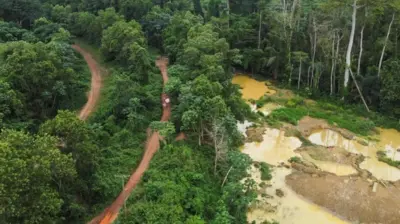We've updated our Privacy and Cookies Policy
We've made some important changes to our Privacy and Cookies Policy and we want you to know what this means for you and your data.
Ynysddu: Caerphilly council let contaminated water spill onto road
Image source, PA Media
A council allowed liquid contaminated with hazardous chemical waste to spill from a landfill site onto a public road, an environmental regulator found.
Caerphilly council manages Ty Llwyd quarry, Ynysddu.
Toxic waste from a chemical manufacturer was dumped there in the 1960s and 1970s.
In January, heavy rains caused liquid to spill from the quarry, through a woodland and onto the road, Natural Resources Wales said.
After the initial reports, Caerphilly council denied that any of the water leaving the woodland was contaminated, saying it treated the contaminated liquid, known as leachate, in an aeration chamber, leaving "just normal surface water run-off".
Several days later, reporters from the PA news agency found this chamber to be overflowing with brown foamy liquid that gave off an unpleasant smell.
Samples taken by independent councillors Jan Jones and Janine Reed and analysed by Greenpeace scientists found the liquid to be heavily contaminated with dangerous chemicals.
Environmental regulator Natural Resources Wales (NRW) said it attended the site on 3 January, and has been investigating the pollution since, taking its own samples.
On 20 June, NRW issued a warning to Caerphilly council, saying the local authority committed an offence of causing or knowingly permitting a water discharge activity and that pollution to land and water had occurred.
Caerphilly council said: "The level of rainfall caused the leachate drainage system serving the quarry to overtop, resulting in water containing leachate to leave owned land known as Pantyfynnon woodland and discharge on to the public highway below the site.
"Since the event, the council has continued to work in partnership with NRW in relation to Ty Llwyd and have recently entered into pre-application discussions to determine whether there is a requirement for a formal water discharge consent to be in place at the site.
"Further technical assessments will be required to inform this process and the council will be working with their contaminated land consultants to progress this work and produce an updated management plan for the site."
Top Stories
More to explore
Most read
Content is not available








